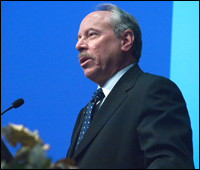CDC In the News
CDC Explores: Tension often exists between scientific advances and human values
Published: January 8, 2008

Alan I. Leshner, PhD said public engagement would ease tensions between science and society. He spoke at the 28th Annual Joseph W. Mountin Lecture. Photo by Greg Knobloch
Scientific advances often clash with human core values, creating a unique tension in the relationship between science and society, according to Alan I. Leshner, Ph.D., the chief executive officer of the American Association for the Advancement of Science (AAAS),
Julie Gerberding, MD, MPH, director for the Centers for Disease Control and Prevention, provided the introduction for Alan I. Leshner, Ph.D., the featured speaker at the recent 28th annual Joseph W. Mountin Lecture, held at CDC.
Gerberding described Leshner as a remarkable leader with "a mature and wise vision of how important it is that we respect public values as we think about what science can do and how we utilize the results of that science."
Leshner framed his comments around a quote from Charles Dickens' A Tale of Two Cities: "It was the best of times; it was the worst of times." Leshner stated that science was experiencing the best of times in regards to remarkable medical and technological advances, such as understanding the workings of the human brain and embryonic stem cell research. However, the worst of times are being experienced when society impacts science by imposing moral, political and religious views that threaten to slow down or interfere with scientific progress.
"This overlay of values is having tremendous consequences for the science-society relationship," says Leshner. "Society wants to influence the course of science—not just in a positive way and to pose new questions—but people are saying, "I don't want the answer to that.' It's creating a divide."
Where do we come from
Leshner said questions such as, "Where do we come from?" and "When does life begin?" cannot be answered by science, yet the scientific community is inevitably drawn into the debate. "It's our fault that the public doesn't understand the limits of science," he said. "Fundamentally, we sort of believe that science can answer anything. But there are many questions important to humankind that are outside our domain. One of them is whether or not there is a God. It's not a scientific question; therefore, scientists should keep quiet about it."
Leshner believes the growing tension experienced between science and society will likely increase as science progresses. He defined the tension as twofold: the conflict between scientific advances and political or economic expediency, and the conflict involving core human values. As science encroaches upon core human values, it is making the public uncomfortable and placing the science-society relationship under pressure.
"The objections to embryonic stem cells don't have to do with whether people don't believe they will ultimately have therapeutic benefit to society," said Leshner. "People's objections have to do with how conducting the research involving human embryos intersects with their own moral or religious beliefs. Your belief about when life begins is almost 100 percent determined by whether you think [such research] is morally acceptable." Leshner added that it's not so much that people lack understanding; it's that the answers they hear conflict with their personal views.
Focus on Communicating with the Public
Leshner pointed out that people need to learn more about science as an enterprise, and to understand what makes something scientific. He cautioned that, education alone, although important, would not significantly ease tensions between science and society. What's needed, he proposed, is a new concept: moving from a philosophy of public understanding to one of public engagement, which can be accomplished by communicating with the public as opposed to communicating to the public, thus creating a true dialogue.
Leshner defined public engagement as the process of listening and responding to the public about their concerns and priorities, such as large town hall meetings, whereby experts participate in a panel discussion and then answer a few questions from the audience. "Typically, those meetings make us feel good but don't have any real communication," he said.
A better approach is to hold smaller, decentralized gatherings where people can have greater participation. "There's no magic bullet," said Leshner, "but we need an array of venues to try to use converging strategies." One strategy that he recommends is based on a "glocal" concept, whereby scientists look at a global issue and work with local media and community groups, like retirement communities, to make the issue meaningful for people on a personal level.
"Public engagement is an acquired skill," said Leshner. "Most scientists are not very good at speaking to the public and are not good at listening – so we have to figure out how to train them to genuinely reach out to neighbors and community groups." By sticking to the facts, focusing on their area of expertise, and avoiding the use of jargon, scientists can help the public better understand the impact of science in every aspect of modern living.
According to Leshner, having a healthy science-society relationship is essential for the well being of the science community as well as the public—and that it is worth every effort to restore the equilibrium between the two.
Page last modified: January 8, 2008
